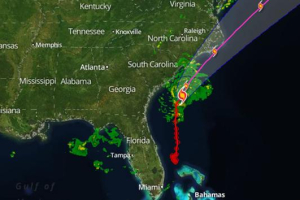Hurricane Arthur is gaining momentum as it is expected to hit the North Carolina coast the night of July 4th, the National Hurricane Center reports.
The storm, which developed into a hurricane early in the day, may reach Category 2 strength with winds of 105 mph before grazing the coast, then steadily weaken as it moves north, the National Hurricane Center said. The Center also says Arthur is centered about 260 miles southwest of Cape Hatteras, North Carolina, and about 110 miles south-southwest of Cape Fear. Currently, it's moving north at 14 mph.
"This is no time to put your stupid hat on," North Carolina Gov. Pat McCrory told CNN's "New Day" on Thursday.
CNN reports that the storm will bring large, damaging waves, high winds and dangerous rip currents that authorities warned could dangerously pull even the strongest of swimmers out to sea.
"Don't get brave just because you see some good waves out there," McCrory said. "Stay out of the water ... and make sure we don't have to come rescue you and put our emergency workers in jeopardy."
Currently, parts of South Carolina and Virginia are under tropical storm warnings, and authorities have ordered mandatory evacuations for Hatteras Island and a voluntary evacuation order for Ocracoke Island. Officials told residents and out-of-town visitors who already may have arrived at for the Fourth of July weekend to evacuate during daylight before the tropical storm hits the popular vacation spot. The two-lane highway is the only way on and off the island other than ferries to the south, and twice in recent years, storm-driven waves have rendered the road impassable, USA Today reports.
"The focus right now is really getting people to evacuate," said Craig Fugate, director of the Federal Emergency Management Agency.
Fox News reports that Outer Banks residents and out-of-town visitors who fail to evacuate ahead of the hurricane's expected arrival should prepare for possibly getting stuck for several days without food, water or power, National Hurricane Center forecaster Stacy Steward said Thursday.
"We want the public to take this system very seriously, go ahead and start their preparations because time is beginning to run out," he said.
Tropical cyclones like "Arthur" killed six people in 2009, the National Weather Service said. All drowned in large waves or rip currents. If Arthur makes landfall in the U.S. on Friday, it would be the first hurricane to do so on July Fourth, according to National Hurricane Center research.

















